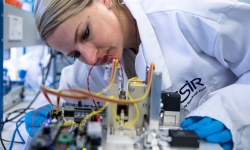Technology for better healthcare
Modern healthcare systems are dependent on reliable electronic systems to keep patient records, facilitate fast clinical decision-making and ensure efficient communication between healthcare professionals and patients. These systems need to accommodate the latest technology, such as point-of-care diagnostic tools, especially in the South African healthcare landscape where many communities live in remote and under-serviced locations. The CSIR has developed technologies with significant potential impact for South African healthcare provision.
The challenge: Suboptimal healthcare
As a result of resource constraints, many marginalised communities receive suboptimal health services. Challenges include insufficient record keeping of patient data leading to delays, duplication or incomplete patient history profiles as well as limited access to specialised services such as prenatal screening and pathology tests. Other health challenges relate to efficient primary healthcare delivery, which requires a proactive approach to prevent medical complications that require specialist interventions, such as complications related to chronic conditions and pregnancy.
Research and development: Technology for better care
The CSIR has applied its multidisciplinary expertise to strengthen primary healthcare in the country. This includes the strengthening of information and communications technology systems and the development of point-of-care diagnostic devices.
Efficient electronic systems
Knowledge of patient demographics and a record of patient movement through health facilities are fundamental in delivering integrated healthcare services and are required for planning aspects of the national health system. The CSIR and the National Department of Health have partnered to develop the National Health Patient Registration System, which allows for the registration and identity verification of patients at public health facilities. The system has thus far been deployed in 1 859 facilities and 6 355 759 registrations have been captured on a central database.
A point-of-care ultrasound device
One of the challenges with reducing South Africa’s infant mortality rate is improving access to specialist obstetric care for those that need it while reducing unnecessary referrals. In trials undertaken in the Tshwane district it was shown that a CSIR-developed Doppler ultrasound device has the potential to significantly reduce the perinatal mortality rate. The Tshwane clinical trial started on 4 May 2015 and is in its second year in multiple clinics. To date more than 2 640 women have participated in the trial of which 324 were classified as high risk and referred to the Mamelodi Hospital.
Of a group of 1 096 women who have given birth, 10% showed abnormal results with the Umbiflow screening. It is estimated that about 10% of the group showing abnormal results would reasonably have been expected to have a stillbirth if the abnormal reading had not been detected by Umbiflow.
The perinatal mortality rate for women who had access to Umbiflow testing was 11.3/1 000 deliveries, and among those who were not Umbiflow-screened, the mortality rate was 21/1 000. This indicates that Umbiflow has the potential to reduce the perinatal mortality rate by up to 50%. Umbiflow is also highly cost-effective – each screening costs less than R500. This trial will be extended to nine sites across all provinces to validate Umbiflow in different settings.
Pathology training support
The CSIR joined forces with the National Health Laboratory Service (NHLS) to develop a national digital pathology database containing 104 medical case studies focusing on South Africa's unique disease burden. For each case study, clinical history, blood counts and digital morphology images were captured. More than 1 200 digital images with detailed annotations have been captured. The NHLS is using this database to provide annual haematology morphology training courses.
On-site blood test device
The majority of South Africans receive their medical care at primary healthcare facilities, such as clinics and community centres. If the healthcare centres are located far from centralised laboratories, the delays caused by the transport of blood samples and test results may detrimentally affect the quality of patient care. In another partnership with the NHLS, CSIR researchers have developed a device, called Cellnostics, to perform quick and effective on-site blood tests to reduce the time between tests and diagnosis and subsequent treatment.
The portable wireless blood analyser allows for two-way communication between the clinic and a central laboratory. Medical professionals can also access the information with cell phones and tablets.
Cellnostics uses microfluidic technology to prepare blood samples for analysis. Microfluidics involves the manipulation of very small volumes of fluid, typically at the nano- to femto-litre levels. Holography and other novel optical techniques record physical information from the blood samples prepared by the microfluidic cartridge.
During 2016/17, two design versions of the microfluidic cartridge were tested and evaluated in CSIR laboratories and their performance was found to be comparable to gold standard tests in a pathologist’s laboratory. The next step is to conduct clinical assessments with the device in partnership with the NHLS. Two patents related to the device, a 4D light field microscope and an analysis system, method and device have been registered.



